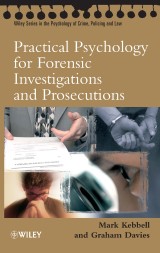Details

Practical Psychology for Forensic Investigations and Prosecutions
Wiley Series in Psychology of Crime, Policing and Law, Band 31 1. Aufl.
|
49,99 € |
|
| Verlag: | Wiley |
| Format: | |
| Veröffentl.: | 14.08.2006 |
| ISBN/EAN: | 9780470092156 |
| Sprache: | englisch |
| Anzahl Seiten: | 248 |
DRM-geschütztes eBook, Sie benötigen z.B. Adobe Digital Editions und eine Adobe ID zum Lesen.
Beschreibungen
<p>This book it is a comprehensive guide, aimed at professionals, that starts with the interview of the victim of the crime, moving through the interviewing of suspects, to the decision to prosecute and enhancing the quality of evidence presented in court. Other topics discussed include: false allegations, false confessions, offender profiling and victim support. Throughout, the theme of the book is that the chain of events leading to the successful investigation and prosecution of offences is only as strong as the weakest link, and should be considered as a coherent whole.</p>
About the Editors. <p>About the Contributors.</p> <p>Acknowledgements.</p> <p>Preface.</p> <p>Introduction (<i>Graham Davies and Mark Kebbell</i>).</p> <p>1. Interviewing Victims of Crime, Including Children and People with Intellectual Disabilities (<i>Becky Milne and Ray Bull</i>).</p> <p>2. Procedural Recommendations to Increase the Reliability of Eyewitness Identifications (<i>Jennifer Beaudry, Rod Lindsay and Paul Dupuis</i>).</p> <p>3. Investigating Criminal Cases of Delayed Reports of Sexual Abuse (<i>Laurence Alison and Mark Kebbell</i>).</p> <p>4. Psychological Characteristics of Offenders (<i>Kevin Howells and Jacqueline Stacey</i>).</p> <p>5. Detecting Deception (<i>Aldert Vrij</i>).</p> <p>6. Improving the Interviewing of Suspected Offenders (<i>Mark Kebbell and Emily Hurren</i>).</p> <p>7. Strategies for Preventing False Confessions and Their Consequences (<i>Deborah Davis and Richard Leo</i>).</p> <p>8. Offender Profiling: Limits and Potential (<i>Laurence Alison and Mark Kebbell</i>).</p> <p>9. Deciding to Prosecute (<i>Elizabeth Gilchrist</i>).</p> <p>10. Preventing Withdrawal of Complaints and Psychological Support for Victims (<i>Graham Davies and Helen Westcott</i>).</p> <p>11. Communicating Risk to the Court (<i>Don Grubin</i>).</p> <p>12. Future Directions for Applying Psychology to Forensic Investigations and Prosecutions (<i>Mark Kebbell and Graham Davies</i>).</p> <p>Index.</p>
<b>Mark Kebbell</b> is an associate professor at the James Cook University, Townsville, Australia. He co-wrote (with Graham Wagstaff) guidelines for police officers in England and Wales on the assessment of eyewitness evidence, and has published many journal articles. <p><b>Graham Davies</b> is co-series editor with Ray Bull and a professor of psychology at the University of Leicester. He is co-editor of <i>Applied Cognitive Psychology</i>; amongst his numerous publications, and the most recent for Wiley, is <i>Recovered Memories: Seeking the Middle Ground</i>.</p>
<p>Despite important technological advances, most forensic investigations and prosecutions still rely heavily upon human factors. It is in understanding these human factors that psychology has a major role to play.</p> <p>This book brings together cutting-edge researchers in forensic psychology to show how psychological knowledge can be applied to investigating and prosecuting offences. It takes a holistic approach, linking together the different stages of the investigation and prosecution processes, demonstrating what psychology can contribute at each stage. The links between maximising reporting rates, thorough investigation, proper presentation of evidence in court, and of effective sentencing policy are examined. Potential pitfalls for the investigative and prosecution process are outlined and ways of overcoming these problems discussed.</p> <p><i>Practical Psychology for Forensic Investigations and Prosecutions</i> describes contemporary research but it is also immensely practical. Written for police officers, lawyers, forensic psychologists and social workers, it will also be a valuable resource for all psychology students who wish to see how psychology can assist policing and the law.</p>
Diese Produkte könnten Sie auch interessieren:

The Wiley-Blackwell Handbook of Childhood Social Development

von: Peter K. Smith, Craig H. Hart

136,99 €
















